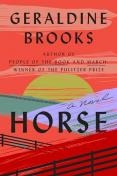
Horse: A Novel
by Brooks Geraldine
Hardcover- $24.27
“Brooks’ chronological and cross-disciplinary leaps are thrilling.” —The New York Times Book Review
by Brooks Geraldine
Hardcover- $24.27
“Brooks’ chronological and cross-disciplinary leaps are thrilling.” —The New York Times Book Review
“Horse isn’t just an ...
MEMBER LOGIN
BECOME A MEMBER it's free
Book Club HQ to over 90,000+ book clubs and ready to welcome yours.
SEARCH OUR READING GUIDES
Search
FEATURED EVENTS
PAST AUTHOR CHATS
JOIN OUR MAILING LIST
Get free weekly updates on top club picks, book giveaways, author events and more
Get free weekly updates on top club picks, book giveaways, author events and more
Please wait...








